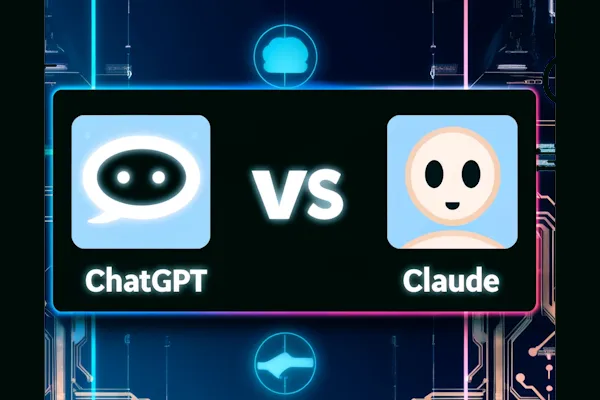
ChatGPT vs. Claude: The Battle of AI Giants
Artificial Intelligence (AI) has taken the world by storm, transforming how we interact with technology. Among the frontrunners in this AI revolution are ChatGPT and Claude, two powerful AI chatbots. Whether you're a tech enthusiast or just curious about the latest advancements, understanding the differences and capabilities of these two AI giants can be fascinating and useful. Let's dive into the world of ChatGPT and Claude to see how they stack up against each other.
Introduction to AI Chatbots
Before we compare ChatGPT and Claude, it's essential to understand what AI chatbots are. AI chatbots are computer programs designed to simulate human conversation. They can understand and respond to text or voice inputs in a way that mimics natural human interaction. These chatbots use sophisticated algorithms and large datasets to generate responses that are contextually relevant and informative.
Meet ChatGPT
ChatGPT, developed by OpenAI, is one of the most popular AI chatbots today. "GPT" stands for "Generative Pre-trained Transformer," which is a type of model used to generate human-like text. ChatGPT has been trained on a vast amount of internet text, allowing it to understand and generate responses on a wide range of topics.
Key Features of ChatGPT:
1. Versatility: ChatGPT can handle a wide variety of topics, from answering simple questions to providing detailed explanations on complex subjects.
2. Conversational Skills: It excels in maintaining a flow of conversation, making it feel more natural when interacting with users.
3. Customization: Users can fine-tune ChatGPT for specific tasks, making it adaptable for different applications, such as customer service, tutoring, or even creative writing.
Meet Claude
Claude, on the other hand, is a powerful AI chatbot developed by Anthropic. While it shares similarities with ChatGPT, Claude is designed with a focus on ethical AI and robust performance. Named after Claude Shannon, the father of information theory, this chatbot aims to push the boundaries of safe and reliable AI interactions.
Key Features of Claude:
1. Ethical AI: Claude is built with a strong emphasis on safety and ethical use, ensuring that its responses are appropriate and responsible.
2. Reliability: Claude is designed to provide consistent and accurate information, reducing the risk of generating misleading or harmful content.
3. User-Friendly: It offers a straightforward and intuitive interface, making it easy for users of all technical levels to interact with.
Comparing ChatGPT and Claude
Now that we have a basic understanding of both chatbots, let's compare them across several key areas:
1. Training Data:
- ChatGPT: Trained on a diverse dataset that includes a wide range of internet text, making it versatile but sometimes prone to generating biased or inappropriate content.
- Claude: Trained with a focus on ethical guidelines, aiming to minimize biases and ensure safe interactions.
2. Performance:
- ChatGPT: Known for its impressive conversational abilities and versatility, but occasionally may produce less accurate or off-topic responses.
- Claude: Emphasizes reliability and accuracy, providing more consistent and dependable responses, especially in critical applications.
3. Ethical Considerations:
- ChatGPT: While capable, it requires careful monitoring to prevent misuse or the generation of harmful content.
- Claude: Designed with built-in ethical safeguards, making it a safer choice for applications where responsible AI usage is paramount.
4. Customization and Adaptability:
- ChatGPT: Highly customizable, allowing users to fine-tune it for specific tasks and applications.
- Claude: While customizable, its primary focus is on maintaining ethical standards and reliability, which can sometimes limit its adaptability compared to ChatGPT.
Practical Applications
Both ChatGPT and Claude have a wide range of practical applications. Here's how they can be used in different scenarios:
1. Customer Service:
- ChatGPT: Can handle a broad range of customer queries, providing detailed and contextually relevant responses.
- Claude: Offers reliable and safe customer interactions, ensuring that responses are accurate and appropriate.
2. Education:
- ChatGPT: Excellent for tutoring and providing explanations on various subjects, making learning more interactive and engaging.
- Claude: Ensures that educational content is accurate and responsibly delivered, making it a trustworthy tool for educators.
3. Creative Writing:
- ChatGPT: Can generate creative content, such as stories, poems, and scripts, making it a valuable tool for writers.
- Claude: While also capable of creative tasks, it focuses on maintaining ethical standards in its content generation.
Conclusion
In the battle of AI giants, ChatGPT and Claude each bring unique strengths to the table. ChatGPT excels in versatility and conversational skills, making it a powerful tool for a wide range of applications. Claude, with its emphasis on ethical AI and reliability, ensures safe and responsible interactions.
Choosing between ChatGPT and Claude ultimately depends on your specific needs and priorities. If you value versatility and customization, ChatGPT might be the better choice. However, if ethical considerations and reliability are your top priorities, Claude stands out as the ideal option.
As AI technology continues to evolve, both ChatGPT and Claude will likely keep improving, offering even more advanced features and capabilities. Whichever chatbot you choose, you can be confident that you're leveraging some of the most advanced AI technology available today.


